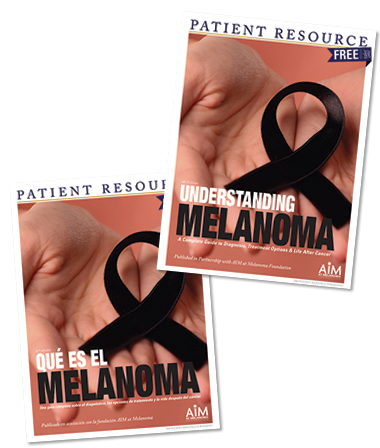
Melanoma
Side Effects
One of the most common fears people have about cancer treatment is the potential side effects. Although most cancer and its treatments cause side effects, you will be surrounded by a health care team who will help you manage the symptoms from the moment you receive your diagnosis. You are encouraged to talk with your medical team before treatment begins about possible side effects and what to do if they occur.
Communicating honestly about how you feel, both physically and emotionally, is an important step you can take. The sooner you share your concerns, the quicker they can be managed. It’s also important to be honest with your family, caregiver and medical team about the side effects you have and their level of severity.
Common Physical Side Effects
Some physical side effects can be disruptive while others are an annoyance (see Table 1). Ask your doctor how you can recognize symptoms, when they might occur and ways you can help manage them. Managing side effects allows you to stay on treatment without interruption, making it easier for your body to handle treatment and generally improves your well-being.
It may comfort you to know that people often respond differently to the same treatments, so it is important to discuss with your doctor which side effects you may experience. Keeping track of your side effects helps your doctor to better manage them.
Potentially Severe Side Effects
Some of the drug therapies used may be accompanied by side effects that can become serious and potentially life-threatening. Make sure you know whom to contact and how, especially after hours. Contact the appropriate person immediately if you experience any symptoms. Prompt treatment is necessary to keep these symptoms from becoming fatal.
Not all potentially severe side effects are ones you can recognize. Some are identified only on lab work and imaging results, so it is crucial to stay on schedule with your follow-up appointments for monitoring. Some potentially severe side effects include the following:
Immune-related adverse events (irAEs) are associated with certain immunotherapy drugs. They can occur if the immune system becomes overstimulated by treatment and causes inflammation in one or more organs or systems in the body (see Table 2). Some irAEs can develop rapidly, becoming severe and even life-threatening without swift medical attention.
Some irAEs can be detected early during routine laboratory and imaging tests even before you can feel symptoms, which makes it crucial to stay on schedule with all medical appointments. Contact your medical team if symptoms arise between appointments and remain alert to the possibility of irAEs for up to two years after completing immunotherapy.
Infection can occur as a result of surgery, a low white blood cell count (neutropenia/leukopenia) or other factors. Contact your doctor immediately – do not wait until the next day – if you have any of these symptoms: oral temperature over 100.4°F, chills or sweating; body aches, chills and fatigue with or without fever; coughing, shortness of breath or painful breathing; abdominal pain; sore throat; mouth sores; painful, swollen or reddened skin; pus or drainage from an open cut or sore; pain or burning during urination; pain or sores around the anus; or vaginal discharge or itching.
Infusion-related reactions most frequently occur with drug therapies, including immunotherapies that are given intravenously (IV) through a vein in your arm or through a port, usually soon after exposure to the drug. Reactions are generally mild, such as itching, rash or fever. Other symptoms, such as shaking, chills, low blood pressure, dizziness, throat tightness, skin rash or flushing, breathing difficulties and irregular heartbeat, can be serious or even fatal without rapid medical intervention.
Cytokine release syndrome (CRS) occurs when immune cells are stimulated by treatment and release too many cytokines into the blood stream. A cytokine is a type of protein that is made by certain immune and non-immune cells, and it is a part of a healthy immune system. These small proteins help control the growth and activity of your blood cells and immune cells. Some cytokines stimulate the immune system and others slow it down. CRS can lead to high fever, inflammation, fatigue and nausea that can be severe and damage multiple organs. Without swift medical treatment, CRS can be fatal.
Table 1: Immune-related adverse events (IRAEs)
| Body System | irAE | Symptoms and Signs |
| Cardiovascular | Myocarditis | Chest pain, shortness of breath, leg swelling, rapid heartbeat, changes in EKG reading, impaired heart pumping function |
| Endocrine | Endocrinopathies | Hyperthyroidism, hypothyroidism, diabetes, extreme fatigue, persistent or unusual headaches, visual changes, alteration in mood, changes in menstrual cycle |
| Gastrointestinal | Colitis | Diarrhea with or without bleeding, abdominal pain or cramping, bowel perforation |
| Liver | Hepatitis | Yellow/orange-colored skin or eyes (jaundice), nausea, abdominal pain, fatigue, fever, poor appetite |
| Nervous system | Neuropathies | Numbness, tingling, pain, a burning sensation or loss of feeling in the hands or feet, sensory overload, sensory deprivation |
| Neurologic | Encephalitis | Confusion, hallucinations, seizures, changes in mood or behavior, neck stiffness, extreme sensitivity to light |
| Pulmonary/lung | Pneumonitis | Chest pain, shortness of breath, unexplained cough or fever |
| Renal/kidneys | Nephritis | Decreased urine output, blood in urine, swollen ankles, loss of appetite |
| Skin | Dermatitis | Rash, skin changes, itching, blisters, painful sores |
Managing Emotional Side Effects

Receiving a cancer diagnosis can be so unsettling that it affects your mental health. You may go from being scared or angry to anxious to depressed, sometimes all in a day. Don’t be surprised at the frequency of your mood changes or by how intense your feelings are. Everything you feel is normal, and it is important to approach these emotional side effects as you would physical side effects. Before you become overwhelmed, find out how to get relief and remember that you’re not alone.
Take advantage of the resources around you, starting with your family, friends and community. Your supportive care team can connect you with support groups, advocacy organizations, counselors, psychologists, psychiatrists and other specialists. Some organizations offer one-on-one buddy programs that pair you with another person who has your type of melanoma. It can be comforting to share your feelings with people who can relate.
Many people believe that having a positive attitude makes a difference. Even with the best intentions, be aware that some days will be more difficult than others. Be kind to yourself and accept that it is okay to have the occasional down day.
Following are some of the common emotions you may experience and suggestions for ways to feel better. However, it is critical to notify your health care team if you are unable to follow treatment due to extreme emotional distress; have excessive crying or continued feelings of hopelessness or despair; are unusually angry or irritable; are withdrawing and isolating yourself from family and friends; or feeling worthless. Get immediate medical attention for thoughts of death or suicide.
Anxiety can begin as soon as you receive your diagnosis and may ebb and flow. Moderate to severe anxiety is often treated with medication, therapy or a combination of both. Share your feelings with a trusted friend or by journaling.
Depression is a psychological reaction to your situation as a whole. Certain ongoing treatments, can cause or contribute to depression. Don’t avoid talking to your doctor about it because you think depression is just part of having cancer — it isn’t. Talk with a member of your health care team if you feel hopeless, helpless or numb.
Doubt about the meaning of life and your purpose may arise. Some people find strength from family, friends, the community or spirituality. It may also help to open up to a counselor or support group.
Fear about the treatment, side effects and your prognosis is common. Making plans may become difficult because every ache and pain triggers a concern. Surround yourself with a medical team you trust and a solid support system, and do your best to take it one day at a time.
Guilt may occur if you feel you’ve been a burden to loved ones or if you wonder why you survived when others with similar conditions didn’t. Rely on the support of non-judgmental close friends and family members, and consider talking with a therapist about these feelings.
Scanxiety is a word that describes the anxiety that can happen when you are awaiting results from imaging scans, laboratory tests or examinations. Scanxiety can be extremely stressful, and it may help to find ways to manage it. Set expectations with your medical team so you can know when to expect results instead of being left waiting and wondering. Keep your mind occupied with things you enjoy, such as reading, exercising, social activities or meditation. Staying busy gives you less time to worry.


